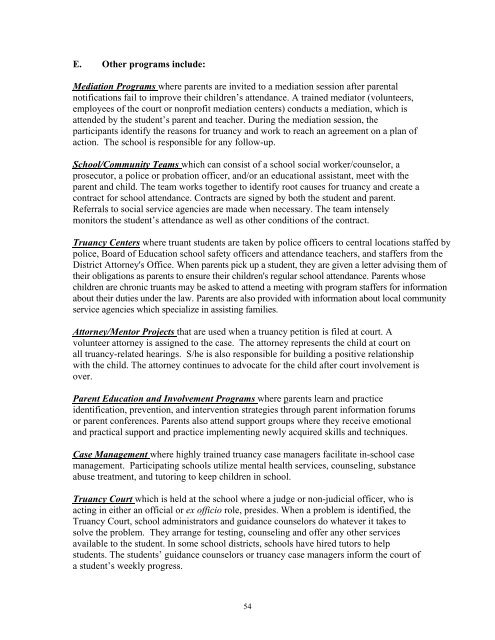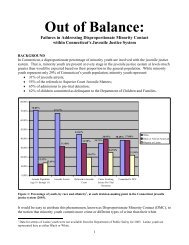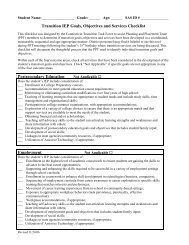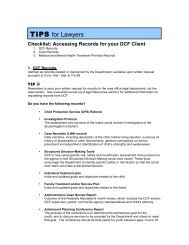FWSN-advisorybd-repo.. - The Connecticut Juvenile Justice Alliance
FWSN-advisorybd-repo.. - The Connecticut Juvenile Justice Alliance
FWSN-advisorybd-repo.. - The Connecticut Juvenile Justice Alliance
You also want an ePaper? Increase the reach of your titles
YUMPU automatically turns print PDFs into web optimized ePapers that Google loves.
E. Other programs include:<br />
Mediation Programs where parents are invited to a mediation session after parental<br />
notifications fail to improve their children’s attendance. A trained mediator (volunteers,<br />
employees of the court or nonprofit mediation centers) conducts a mediation, which is<br />
attended by the student’s parent and teacher. During the mediation session, the<br />
participants identify the reasons for truancy and work to reach an agreement on a plan of<br />
action. <strong>The</strong> school is responsible for any follow-up.<br />
School/Community Teams which can consist of a school social worker/counselor, a<br />
prosecutor, a police or probation officer, and/or an educational assistant, meet with the<br />
parent and child. <strong>The</strong> team works together to identify root causes for truancy and create a<br />
contract for school attendance. Contracts are signed by both the student and parent.<br />
Referrals to social service agencies are made when necessary. <strong>The</strong> team intensely<br />
monitors the student’s attendance as well as other conditions of the contract.<br />
Truancy Centers where truant students are taken by police officers to central locations staffed by<br />
police, Board of Education school safety officers and attendance teachers, and staffers from the<br />
District Attorney's Office. When parents pick up a student, they are given a letter advising them of<br />
their obligations as parents to ensure their children's regular school attendance. Parents whose<br />
children are chronic truants may be asked to attend a meeting with program staffers for information<br />
about their duties under the law. Parents are also provided with information about local community<br />
service agencies which specialize in assisting families.<br />
Attorney/Mentor Projects that are used when a truancy petition is filed at court. A<br />
volunteer attorney is assigned to the case. <strong>The</strong> attorney represents the child at court on<br />
all truancy-related hearings. S/he is also responsible for building a positive relationship<br />
with the child. <strong>The</strong> attorney continues to advocate for the child after court involvement is<br />
over.<br />
Parent Education and Involvement Programs where parents learn and practice<br />
identification, prevention, and intervention strategies through parent information forums<br />
or parent conferences. Parents also attend support groups where they receive emotional<br />
and practical support and practice implementing newly acquired skills and techniques.<br />
Case Management where highly trained truancy case managers facilitate in-school case<br />
management. Participating schools utilize mental health services, counseling, substance<br />
abuse treatment, and tutoring to keep children in school.<br />
Truancy Court which is held at the school where a judge or non-judicial officer, who is<br />
acting in either an official or ex officio role, presides. When a problem is identified, the<br />
Truancy Court, school administrators and guidance counselors do whatever it takes to<br />
solve the problem. <strong>The</strong>y arrange for testing, counseling and offer any other services<br />
available to the student. In some school districts, schools have hired tutors to help<br />
students. <strong>The</strong> students’ guidance counselors or truancy case managers inform the court of<br />
a student’s weekly progress.<br />
54
















